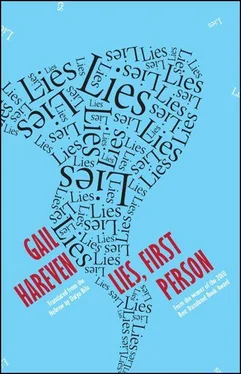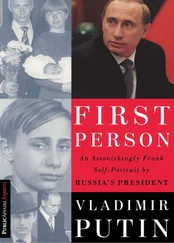The therapist asked me to wait a moment, she went to consult her diary full of other people’s troubles, and came back and said that she could come the next day, if we could make it early, at half past seven in the morning.
Three orderlies had to take hold of my sister in order to carry her to the car. The psychiatrist who signed the committal order had to inject her in the arm. I rolled up her sleeve. .
That’s not how it happened.
Tamar, the therapist, and I persuaded her to admit herself to hospital for observation, and Elisheva — who didn’t want to go to hospital, tried to promise us that she would improve and that she could already feel signs of improvement — went quietly in the end. She packed her bag herself.
No three orderlies had to hold her by force, there was no need for an injection, none of that happened, but it could have happened, it could have, because if three stalwarts had been needed to distance her from me and to distance me from the dark — I would have let them do it. I think she knew it.
My sister was persuaded, and all the persuasion took place in the morning. That night, when I returned to our basement flat, I had only enough courage to tell her that both of us needed help, and that tomorrow morning her therapist would be coming to see us. I asked her if she wanted an omelet and if she would like to watch television with me, and when we were both sitting in front of the television screen, I muttered that I was exhausted and pretended that my eyes were closing against my will. And I sat like that until I was overcome by real exhaustion and really fell asleep. A few hours later, when I woke up, I discovered that she had covered me with a blanket.
My sister’s final hospitalization lasted less than a month, during the course of which I visited her three or four times a week, and hardly stepped foot in our three-and-a-half-room basement apartment. I spent a few nights in my benefactor’s apartment in Ben Yehuda Street, and after that other places were found.
After she went into the hospital Elisheva cooperated willingly with all her therapists, and when she came out her spirit had been renewed: not by the professional staff, but by another patient.
Barnett was in Talbiyeh for less than two weeks. That was apparently enough for him to rid my sister’s mind of all manifest traces of Satan’s presence and to instill in her the belief that he was the man intended to be her husband, and that she was intended — and therefore also worthy and capable — to be his wife.
When she returned to the apartment she no longer needed me and my presence. Barnett and his friends accompanied her when she applied for a passport and arranged for a visa.
The little I did was to buy her a suitcase, two days before she left. And after that we said goodbye.
The illusion of the family trip began to crack about a week before we flew. And at the same time the first mail arrived from Elisheva in which she made some kind of reference to the past.
My sister reiterated her excitement at the prospect of my expected visit, and said that she had been praying for it to happen for years, and that if it had been possible, she would have come to Jerusalem a long time ago. Many of the members of her congregation had visited Israel, some of them saved up and made a pilgrimage every year, and she couldn’t describe the strength they drew from it. And she also added that she hadn’t stopped loving me for a moment, that she and Barnett never stopped loving Jerusalem and speaking of it, and her words seemed to imply that Jerusalem and I were one and the same.
Both of them hoped that one day they would be able to visit, but they were still waiting for a sign that it was already possible. No doubt I understood that for Barnett Jerusalem was liable to be dangerous.
“Tell me more about your mysterious brother-in-law,” requested Oded. For some reason he appeared to be more worried by the thought of spending time with her husband than by the meeting with my sister, but I couldn’t tell him any more than he already knew.
Barnett Davis, a student of veterinary medicine at the University of Illinois, came to Israel with a group of evangelical pilgrims, and the holy city spoke to him. It spoke to him so loudly that he apparently started to hear voices. His initial symptoms were presumably attributed to religious exaltation within the bounds of the normal. But when the muscular round-cheeked blond man stood in the middle of Zion Square — not far from the place where I later collapsed, in the very same month — when Barnett stood there barefoot dressed in a galabieh , and prophesied about the city for two days straight, the members of his group decided that he had to be hospitalized.
Barnett was diagnosed as suffering from the “Jerusalem syndrome,” in addition to which he was also suffering from pneumonia.
The hospitalization was brief. When I met him he was evidently embarrassed by the whole affair, and to the best of my understanding he saw himself not only as having gone out of his mind, but also as a sinner led astray by the devil. “I let myself be blinded by my vanity,” he said to me. My loyal sister, on the other hand, saw things differently: “He was so full of that holy fire, that he couldn’t stand having clothes on his body,” she confided in me, and I, afraid of breaking the spell of the miracle that had been granted me, held my tongue and refrained from remarking that pneumonia gave you a fever.
The first time I met my future brother-in-law he came to our apartment alone. The second time he was accompanied by a couple of old ladies from his group — actually they weren’t old, they just had gray hair, but then they seemed old to me.
It took a few days for me to realize that this deputation had come to ask me for my sister’s hand. In the absence of other relations they hoped for my consent and blessing, and tried to supply all the information that a loving father and mother might have asked for.
Barnett’s father, a dealer in agricultural produce, and a beloved member of his community, had suddenly passed away when his youngest son was a child of ten. His mother, a respected member of her community, supported her four sons by managing a stable where people from the surroundings kept their horses. Two of the sons grew up to become doctors, a third became a farmer, and Barnett, as I probably knew, was going to be a vet. From childhood he had known how to get along with animals. He had learned to ride before he learned to walk, and he had always enjoyed excellent health. In high school he had been on the football team, and today he served as a volunteer assistant to the coach. The intended lived with his mother, a forty minutes’ drive from his university in Urbana. On Sundays, after church, he was in the habit of drinking a modest amount of beer, and outside the football season he spent a lot of time with those of his nephews who lived nearby: all three of them delightful children.
When they had finished introducing my intended brother-in-law to me, and thanking me for the wonderful tea I had prepared — that at least I did, made them tea — one of the ladies hesitantly approached the subject of religion. There were all kinds of Christians, needless to say, and they, as Christian women, were very well aware of the tremendous suffering, the terrible atrocities visited on the Jews in the name of our Lord. In their congregation everyone was very sensitive regarding this subject, and they never let anyone forget it. And so, even though they were Christians of a different kind, and she herself wondered whether those who had committed the atrocities were entitled to call themselves Christians at all, she would understand, understand perfectly, if I, as a Jewess, found it difficult to distinguish between one Christian and another. It would be inhuman and immoral to expect anything else.
Читать дальше












